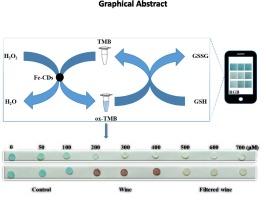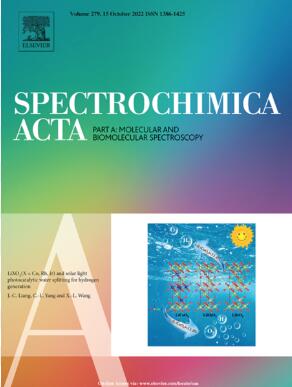基于铁-CD 的 POD 样活性,用比色法和智能手机视觉检测人血清和红葡萄酒中的生物硫醇
IF 4.3
2区 化学
Q1 SPECTROSCOPY
Spectrochimica Acta Part A: Molecular and Biomolecular Spectroscopy
Pub Date : 2024-10-23
DOI:10.1016/j.saa.2024.125280
引用次数: 0
摘要
我们小组还开发了一种基于混合级联系统的 Fe-CDs/GOx 高效模拟过氧化物酶平台,可在原位产生 H2O2 用于葡萄糖的可视化检测。在此,我们进一步利用[Fe-CDs + H2O2 + TMB]系统检测了作为-SH 组代表的生物硫醇(GSH、Cys 和 Hcy)。结果表明,生物硫醇浓度越高,在 652 纳米波长处的吸光度信号越低,oxTMB 的深蓝色变为绿色,直至肉眼观察 20 分钟后褪去。该比色法对 GSH、Cys 和 Hcy 的检出限分别为 0.54、0.29 和 1.41 μM,在其他氨基酸存在的情况下无干扰。基于智能手机和纸张的测定方法对人体血清中的生物硫醇或红葡萄酒中的 GSH 有很好的尊重。这些简单方便的方法有望应用于临床诊断和食品领域。本文章由计算机程序翻译,如有差异,请以英文原文为准。

Colorimetric and smartphone-visual detection of biothiols in human serum and red wine based on POD-like activity of Fe-CDs
An efficient mimic peroxidase platform of Fe-CDs/GOx based on the hybrid cascade system to produce in-situ H2O2 for the visualized detection of glucose has been also developed in our group. Herein, the [Fe-CDs + H2O2 + TMB] system was further performed to detect the biothiols (GSH, Cys, and Hcy) as representatives of the –SH group. The result exhibits that the higher concentration of biothiols can cause the absorbance signal at 652 nm to decrease, and the deep-blue color of oxTMB turns green until it is faded in 20 min by the naked eye. The colorimetric method showed the LOD are 0.54, 0.29, and 1.41 μM for GSH, Cys, and Hcy respectively, without interference in the presence of other amino acids. The smartphone-based and paper-based determination display good respect for biothiols in human serum or GSH in red wine. These simple and convenient strategies provide potential applications in the fields of clinical diagnosis and foods.
求助全文
通过发布文献求助,成功后即可免费获取论文全文。
去求助
来源期刊
CiteScore
8.40
自引率
11.40%
发文量
1364
审稿时长
40 days
期刊介绍:
Spectrochimica Acta, Part A: Molecular and Biomolecular Spectroscopy (SAA) is an interdisciplinary journal which spans from basic to applied aspects of optical spectroscopy in chemistry, medicine, biology, and materials science.
The journal publishes original scientific papers that feature high-quality spectroscopic data and analysis. From the broad range of optical spectroscopies, the emphasis is on electronic, vibrational or rotational spectra of molecules, rather than on spectroscopy based on magnetic moments.
Criteria for publication in SAA are novelty, uniqueness, and outstanding quality. Routine applications of spectroscopic techniques and computational methods are not appropriate.
Topics of particular interest of Spectrochimica Acta Part A include, but are not limited to:
Spectroscopy and dynamics of bioanalytical, biomedical, environmental, and atmospheric sciences,
Novel experimental techniques or instrumentation for molecular spectroscopy,
Novel theoretical and computational methods,
Novel applications in photochemistry and photobiology,
Novel interpretational approaches as well as advances in data analysis based on electronic or vibrational spectroscopy.

 求助内容:
求助内容: 应助结果提醒方式:
应助结果提醒方式:


